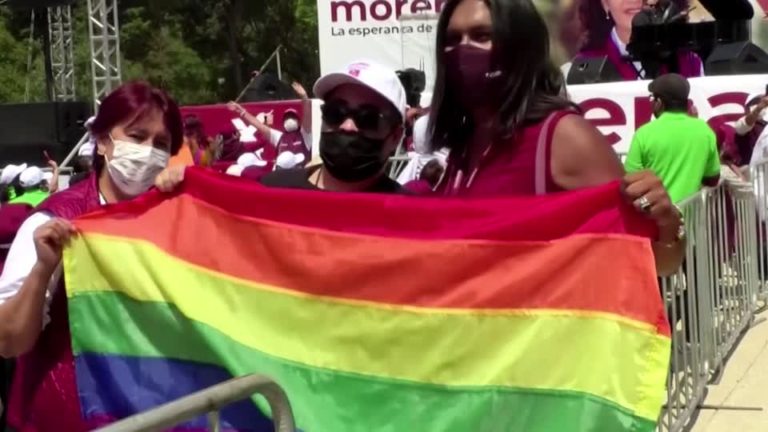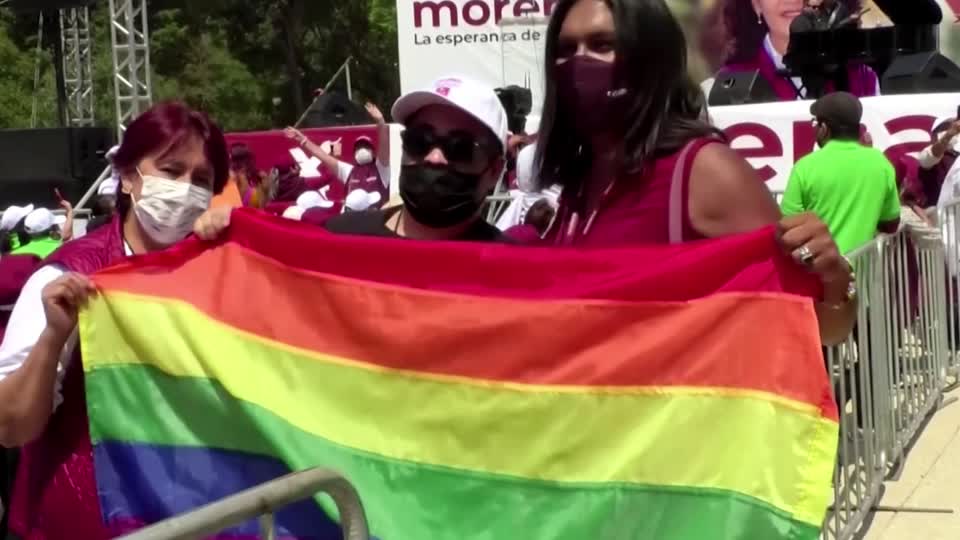

Gay, lesbian, and transgender candidates are running for office in Mexico’s midterm election.
Their cause?
To upset politics as usual in the largely Roman Catholic, socially conservative Latin American country.
Maria Clemente García Moreno wants to become the first trans woman in Mexican Congress.
“There would be discrimination just like there would be anywhere. And for that exact reason we want to go to Congress to combat it in all facets and show up with one voice, a representative voice for the sexual diversity for the trans community, to have a voice in the commissions, in parliamentary life, precisely to break that circle of discrimination.”
She’s one of the 117 candidates identified as part of the LGBT community running for office in June.
Public safety and tackling hate crime are among their key focus.
117 LGBT people were killed in 2019, up almost a third from 2018 and the highest since 2015. That’s according to data compiled by local advocacy group Letra S.
This growth spurred activist Aurelien Guilabert to run for the capital’s local congress.
“I am running because we are suffering one of the worst crises of violence. Crimes against diverse populations, hate crimes for questions of sexual orientation or gender, have gone up. And there doesn’t exist to date a registry on the part of the authorities.”
Mexico’s political parties were already required to nominate equal numbers of men and women.
And new rules adopted by the national electoral institute INE last January added the obligation to nominate candidates from vulnerable groups, including the LGBT community.
But for Roshell Terranova, a candidate for deputy from the Mexican Citizens’ Movement, getting elected to Congress is just the beginning.
“Laws do not reform on their own. You have to lobby with other groups. You have to work to change people’s thinking, including that of legislators because, let’s not forget, there are ultra-right parties that use the shield of, ‘it’s for families,’ to not grant us our rights. So I think it’s going to be very interesting to be able to continue advancing with our rights from within.”
Video Transcript
– Gay, lesbian, and transgender candidates are running for office in Mexico’s midterm election. Their cause, to upset politics as usual in the largely Roman Catholic, socially conservative Latin American country.
– [SPEAKING SPANISH]
– Maria Clemente Garcia Moreno wants to become the first trans woman in Mexican Congress.
MARIA CLEMENTE GARCIA MORENO: [SPEAKING SPANISH]
– There would be discrimination, just like there would be anywhere. And for that exact reason, we want to go to Congress to combat it in all facets, and show up with one voice– a representative voice for the sexual diversity for the trans community. To have a voice in the commissions and parliamentary life, precisely to break that circle of discrimination.
MARIA CLEMENTE GARCIA MORENO: [SPEAKING SPANISH]
– She’s one of the 117 candidates who identified as part of the LGBT community, running for office in June. Public safety and tackling hate crime are among the key focus. 117 LGBT people were killed in 2019, up almost a third from 2018, and the highest since 2015. That’s according to data compiled by local advocacy group, Letra S. This growth spurred activist Aurelien Guilabert to run for the capitol’s local Congress.
AURELIEN GUILABERT: [SPEAKING SPANISH]
– I’m running because we are suffering one of the worst crises of violence. Crimes against diverse populations, hate crimes, questions of sexual orientation or gender have gone up. And to date, there doesn’t exist a registry on the part of the authorities.
AURELIEN GUILABERT: [SPEAKING SPANISH]
– Mexico’s political parties were already required to nominate equal numbers of men and women. And new rules adopted by the National Electoral Institute, INE, last January, added the obligation to nominate candidates from vulnerable groups, including the LGBT community.
But for Roshell Terranova, a candidate for deputy from the Mexican Citizens’ Movement, getting elected to Congress is just the beginning.
ROSHELL TERRANOVA: [SPEAKING SPANISH]
– Laws do not reform on their own. You have to lobby with other groups. You have to work to change people’s thinking, including that of legislators. Because let’s not forget, there are ultra-right parties that use the shield of, it’s for families to not grant us our rights. So I think it’s going to be very interesting to be able to continue advancing with our rights from within.
ROSHELL TERRANOVA: [SPEAKING SPANISH]